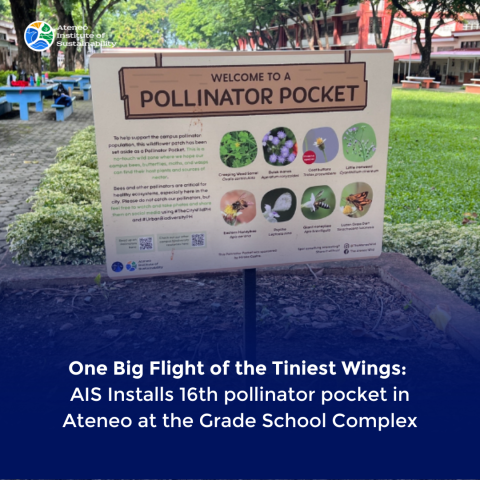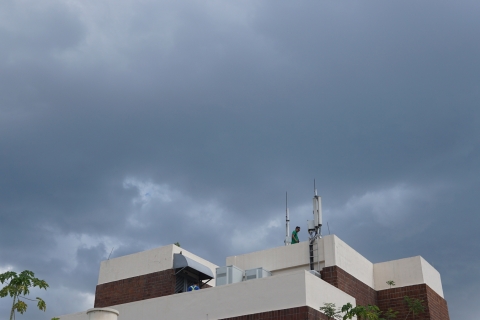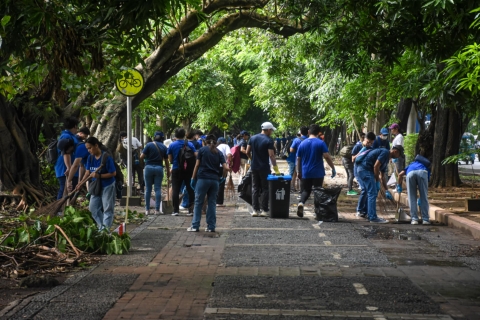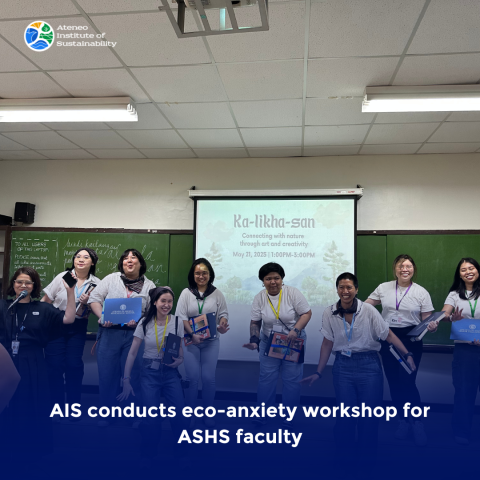Sustainability in Action: Ateneo Student Organizations Embrace Sustainability in Meaningful Ways
11 Mar 2025

Sustainability is emerging as a concrete objective for Ateneo de Manila University student organizations. It is a growing movement. Across various disciplines and advocacies, student-led groups are incorporating environmentally friendly approaches and initiatives into their projects through waste reduction, responsible material use, digital solutions, and more sustainable practices.
The August 2023 sustainability audit by the Office of Student Affairs revealed that while some organizations have established clear sustainability strategies, others are still in the early stages of implementation.
However, what’s clear is that Ateneans and their organizations, with growing awareness of environmental impact, are becoming more proactive in achieving sustainability as part of their organizational culture.
The Ateneo Management Engineering Association (MEA) seeks to expand corporate sustainability. The organization monitors its energy consumption, waste production, and tree-planting efforts with a dedicated environmental footprint tracker. MEA also actively reduces event waste and encourages its members to embrace more sustainable practices. Though major events produce more waste—averaging 5 to 7 kilograms per gathering—the group continuously explores ways to offset its impact.
Other organizations are also making notable strides. The Ateneo Collegiate Society of Advertising and the Ateneo Special Education Society (SPEED) are working toward using nearly 100% recycled materials for decorations and event props while championing creative reuse. SPEED has also been promoting carpooling among its members to reduce carbon emissions, aligning its sustainability efforts with everyday student life.
Meanwhile, the Institute of Skin Divers of Ateneo (ISDA) extends its advocacy beyond the campus through community-based marine conservation efforts. Through outreach programs, ISDA implements awareness-raising activities about protecting marine biodiversity and reducing ocean waste through outreach programs and education initiatives. Similarly, the Ateneo Christian Life Community is taking steps to introduce sustainable materials to the communities it partners with.
Transportation choices reflect students’ commitment to reducing their environmental footprint. The Ateneo Student Exchange Council (ASEC) and the Ateneo Consultants for Organization Development and Empowerment have also reinforced carpooling for events, contributing to minimizing their collective emissions. This initiative has particularly benefited exchange students, encouraging them to adopt eco-friendly habits during their stay.
The Health Sciences Society of the Ateneo (HSS) and the Ateneo Association of European Studies Students (AAESS) highlight different approaches to sustainability. HSS focuses on long-term project sustainability. Meanwhile, AAESS has taken proactive steps to reduce waste, especially during large-scale events like the Ateneo Model United Nations (AMUN). The organization aims to shift entirely to reusable materials for all food-related activities.
Awareness and Engagement: Room for Growth
Despite the positive strides, the level of sustainability awareness varies across student organizations. While groups such as the Ateneo Management Association (AMA) have structured approaches—such as Sustainability Consultants—to ensure environmental goals are met, many organizations still lack formal sustainability frameworks. Most respondents indicated that they are "sometimes" aware of sustainability efforts. Still, only a handful of groups actively track their environmental impact, emphasizing the need to recognize and integrate sustainability into organizational cultures.
Additionally, student organizations have yet to monitor waste generation. In practice, some student organizations' waste reports range from as little as 1 kilogram to as much as 10 kilograms per project. Proper tracking mechanisms must be implemented to contribute to greener initiatives. There is also a felt need to institutionalize certain practices, such as standardizing methods for measuring or enforcing commitments, such as waste reduction.
Sustainability often takes a backseat to financial considerations. While some organizations, such as Ateneo Celadon, emphasize limiting unnecessary spending, others struggle to balance cost-effectiveness with eco-friendly alternatives. Sustainable solutions, such as reusable materials, may require higher upfront costs, which can be a barrier for organizations with limited budgets.
Towards a More Sustainable Campus Culture
Despite these challenges, student organizations are proactive. They propose digitizing processes to minimize paper use, promote better waste management, and strengthen education on sustainability within organizations. Some groups also consider partnering with sustainability-focused organizations to learn best practices and implement more effective strategies.
Sustainability Audit: Takeaway
A key takeaway from the sustainability audit is the need for a unified sustainability framework at Ateneo. Organizations with explicit guidelines and support systems could integrate sustainability more seamlessly into their activities. Formalizing waste tracking could improve accountability and help organizations measure their impact over time.
Ultimately, the goal is for sustainability to become "second nature" rather than just an option.









